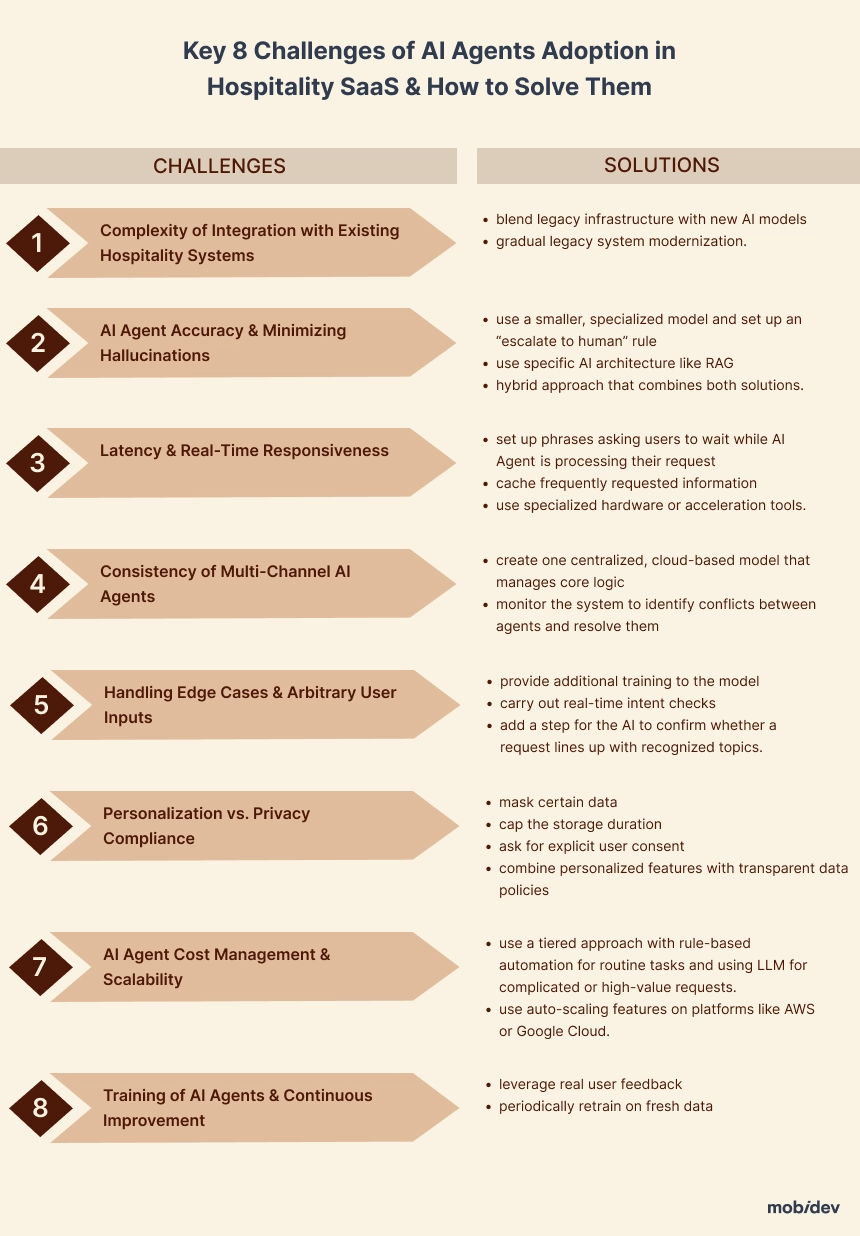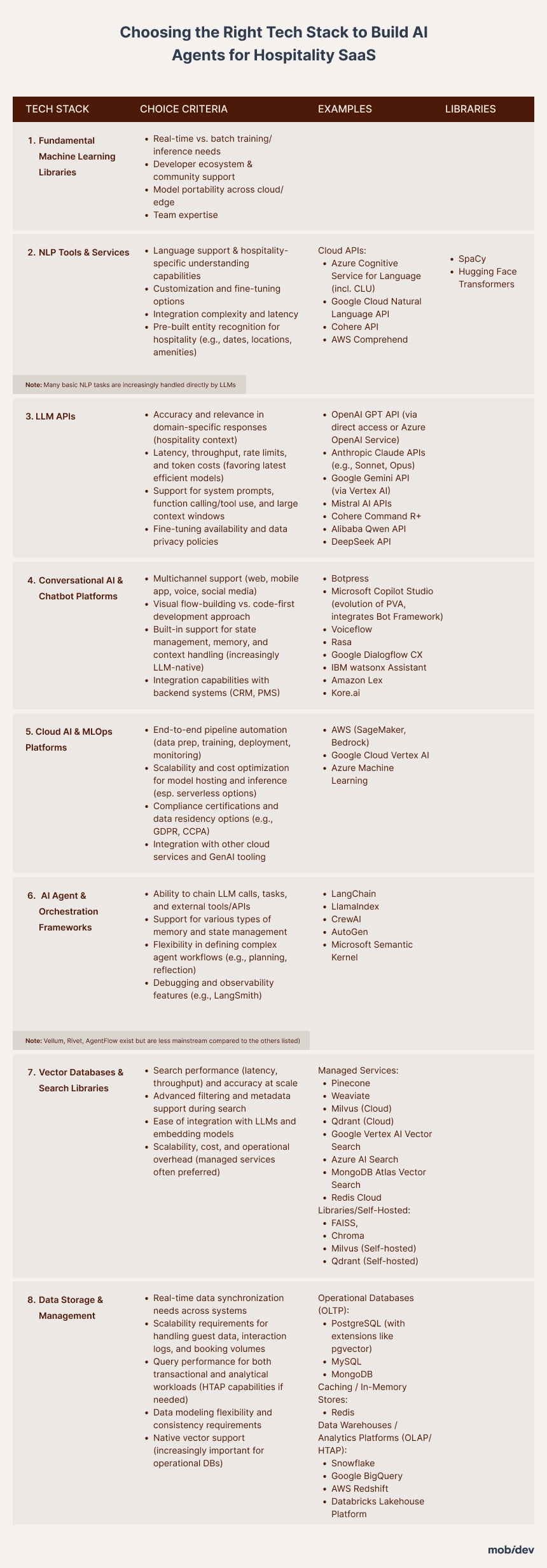Contents:
The hospitality world—spanning lodging, restaurants, bars, and more—is evolving rapidly, and AI is right at the heart of that transformation. For SaaS providers serving the industry, AI agents are quickly becoming essential tools for delivering smoother guest experiences, automating day-to-day tasks, and making smarter decisions based on real data. But building AI agents that are actually reliable takes more than just plugging in a model—it starts with choosing the right tech stack and having a clear roadmap for growth.
This guide is here to walk you through what that looks like in practice. It’s written for CTOs and tech leaders who are navigating the challenges of scaling AI inside hospitality SaaS platforms—without compromising on speed, security, or stability. What we’re sharing comes from hands-on experience helping companies build flexible, cost-effective AI tools that can keep up with the pace of change in the industry.
My name is Iurii Luchaninov, and I’m a Solutions Architect with over 20 years of experience in full-stack development and software architecture. I specialize in designing AI-powered systems using technologies like LLMs and LangChain. In this article, I’ll share practical insights on building agentic AI that’s scalable, reliable, and ready for the hospitality industry.
And make no mistake: the pressure is on. A Statista study projected that in the U.S., without significant investment in generative AI, online travel agencies (OTAs) could grow their booking share from 32% to 46.7% by 2028. However, with active AI adoption by travel suppliers, direct bookings are expected to rise—reducing the OTA share to 29.1% and giving suppliers more control over margins and the guest experience. These numbers highlight how deeply AI will impact distribution strategies, especially in North America.
The 2024 survey found that 15% of restaurants were already running, 27% were testing, and 22% were researching AI projects. Another 17% were in the discovery stage. Only 19% of restaurants weren’t interested in using AI.
Defining the Essential Elements of AI Agents in Hospitality SaaS
AI agents in hospitality generally involve a series of linked modules that handle data ingestion, analysis, and smart response generation. All these modules work together to deliver automated guest support, help staff behind the scenes (in everything from hotel check-ins to restaurant table management), and provide predictive insights for hospitality SaaS users. It’s not just about the algorithms themselves; it’s also about rock-solid infrastructure, data pipelines, and good governance. By understanding these building blocks, SaaS providers can zero in on the right solutions for their products and the specific needs of their users.
Modern AI agents bring together machine learning, language processing, and real-time data syncing to scale up guest interactions. With the right setup of agents in your SaaS platform, your users can enable everything from automated room reservations and restaurant table bookings to personalized dining recommendations—ensuring a truly holistic hospitality experience. Complexity ramps up fast, though, when these AI agents must connect to older property management systems or external services (like payment providers). A well-thought-out system—with secure APIs for each piece—helps minimize messy fragmentation and sets the stage for future improvements.
Data management is truly the backbone of agentic AI in hospitality. Whether you’re dealing with booking details, loyalty programs, or real-time room statuses, it all needs to be managed effectively. The choice of infrastructure also matters. Providers need to balance on-demand computing resources with financial considerations, which often leads to a cloud-based setup. Even then, picking a platform—AWS, Azure, or Google Cloud—should be guided by compliance requirements and how easily it fits into your existing SaaS environment.
8 Key Challenges to Solve When Adopting AI Agents in Hospitality SaaS
Despite all the buzz, AI hospitality agents aren’t without their challenges. They often run into issues at the intersection of system integration, real-time responsiveness, personalization, and cost. Hospitality SaaS providers that tackle these head-on can tap into new revenue and maintain a strong competitive position. Providers not handling these challenges could end up with partial solutions that don’t meet expectations.
Most hospitality tech companies soon realize building AI features is a balancing act. They need high performance, data security, and smooth collaboration between departments. The next sections unpack why these challenges pop up and how teams can solve them with a structured hospitality software development approach.
1. Complexity of Integration with Existing Hospitality Systems
AI agents usually need direct or near-real-time links to property management systems (PMS), POS interfaces, reservation channels, and various CRM tools. While this connectivity is key, older hospitality systems often don’t have modern APIs—or if they do, they’re only partly documented. As a result, providers rely on costly custom connectors or middleware.
How to solve:
The aim is to automate tasks (like check-ins or up-selling) without disrupting the flow of what staff are used to. Doing that well requires a careful plan to blend legacy infrastructure with new AI models.
Another possible solution is gradual legacy system modernization.
2. AI Agent Accuracy & Minimizing Hallucinations
Hospitality AI agents often field nuanced questions about room availability, menu changes, cancellation policies, or loyalty perks—especially when juggling different lodging and dining options. A wrong answer can mean missed bookings and unhappy guests for your SaaS users and can eventually impact your platform’s marketability. Large Language Models (LLMs) can “hallucinate” by making up facts when they’re unsure.
How to solve
To prevent that, developers frequently pair strict fact-checking with rule-based overrides. Practically, this might mean calling on a smaller, specialized model for high-stakes responses and setting up a clear path to a human agent if the AI lacks confidence. Alternatively, you can use specific AI architecture like RAG or a hybrid approach that combines all approaches.
3. Latency & Real-Time Responsiveness
Guests expect immediate answers from AI-driven platforms—any hesitation can feel jarring when making a reservation or checking availability. Advanced LLMs are more resource-intensive than simpler rule-based bots, and network delays from cloud-based AI calls can add even more lag.
How to solve
One way around this is to serve up quick interim responses—like, “Hang tight while I confirm your booking details”—to keep users engaged.
You can also reduce response times by caching frequently requested info and using specialized hardware or acceleration tools.
4. Consistency of Multi-Channel AI Agents
Hospitality AI agents can operate on websites, mobile apps, kiosks, messaging platforms, and voice assistants—covering hotel services, restaurant reservations, bar orders, and event bookings. Each channel has its own design and data flow, which can lead to contradictory responses if the AI logic is spread out and hard to manage. Some teams make separate “mini agents” for each channel, only to discover these solutions clash. On the flip side, a single AI engine can deliver more consistent outputs but may require a more sophisticated backend to serve multiple channels well.
How to solve
A common tactic is to have one centralized, cloud-based model that manages core logic and allows some channel-specific tweaks.
If you have multiple agents, the solution is long-term maintenance when conflicts are reported by the system and investigated by the team. Once the source of conflict is found, the agent responsible for the conflict is reconfigured to solve the issue.
5. Handling Edge Cases & Arbitrary User Inputs
Hospitality covers a wide range of guest requests and cultural norms—whether it’s travelers asking for specific pillows or diners requesting allergy-friendly menu items in multiple languages. Although broad language models have come a long way, LLM-powered systems can slip up if they don’t have enough domain-specific knowledge.
How to solve
Additional training or real-time intent checks often help maintain high customer satisfaction. A good method is adding a step for the AI to confirm whether a request lines up with recognized topics. If not, it can politely ask the guest for more info or escalate to a human.
6. Personalization vs. Privacy Compliance
Modern travelers enjoy getting personalized suggestions (like room types or loyalty offers), but storing and processing personal data can run into legal and ethical hurdles under GDPR, CCPA, and PCI DSS.
How to solve
Ensuring compliance might involve masking some data, capping how long it’s stored, or seeking explicit user consent. The best practice is pairing personalized features with transparent data policies so both guests and property owners feel comfortable.
7. AI Agent Cost Management & Scalability
Sophisticated AI models can get expensive fast, especially if they’re handling thousands of Hospitality SaaS users. Winning a new enterprise-level customer can significantly increase your user base overnight, which can lead to downtime. You have to watch out for training, inference, and infrastructure costs.
How to solve
One fix is a tiered approach that uses rule-based automation for routine tasks while saving more resource-intensive LLM queries for complicated or high-value requests. Using auto-scaling features on platforms like AWS or Google Cloud is another way to dial resources up or down based on what’s really happening in real time.
8. Training of AI Agents & Continuous Improvement
Hospitality businesses frequently update promotions, pricing, and business relationships, making it essential for AI agents to stay current with the latest packages and guidelines. If an agent falls behind, it risks providing outdated information or missing valuable upsell opportunities for SaaS users.
How to solve
Active learning pipelines help maintain accuracy by incorporating real user feedback and periodically retraining on fresh data. This continuous improvement ensures AI remains reliable and aligned with the industry’s fast-moving changes.
Why the Right Tech Stack Matters for AI Agents in Hospitality
Building AI agents for hospitality relies on a solid tech stack. These AI components must process time-sensitive data, handle confidential information, and operate within compliance constraints—so any mismatch in your infrastructure can lead to costly setbacks. Scalability also matters—a system that performs well in a small-scale deployment may struggle when adopted by enterprise-grade platforms serving large hospitality groups. In short, your tech choices have direct impacts on integration, cost-efficiency, and the success of AI-driven features.
Besides looking at pure performance, hospitality SaaS leaders need to consider compliance. Regulations can vary a lot based on region, and data sovereignty laws may require extra care in how or where data is hosted. By choosing platforms designed for both immediate and long-term needs, CTOs lay a sturdy foundation for future guest services, personalization, and analytics. This forward-looking approach helps keep the product stable during seasonal spikes or changes in data laws.
For hospitality SaaS, a well-crafted tech stack is more than an IT concern—it’s a real competitive differentiator. A faster, more streamlined system leads to happy hoteliers, easier integrations, and fewer legal headaches, thanks to built-in security. The payoff is a solution that not only meets the current demands but also keeps pace as AI tech continues to evolve.
Choosing the Right Machine Learning Library for AI Agents in Hospitality
AI agents revolve around machine learning, using models to interpret questions, categorize data, or make predictions. Picking the right framework can significantly affect both performance and how quickly you can develop your product. Each framework has its own strengths, so success usually hinges on matching your particular needs—like fast inference or research-level flexibility—to the ecosystem you’re in.
Here’s a quick rundown of some popular ML frameworks:
- TensorFlow: Great for full-scale deep learning, with plenty of tools for deployment and monitoring.
- PyTorch: Known for its user-friendly design and large research community, making it easy to try out new concepts.
- Scikit-learn: A simpler option for traditional machine learning tasks like regression or clustering—handy for quick analytics.
- LangChain / SmolAgents: Tailor-made libraries for handling the complexities of LLM-based “agentic” workflows, often covering conversation flows, external APIs, and function calls.
Choosing the right framework often starts with defining the features you need. A complex recommendation engine might need deep learning that can handle large volumes of data. A more routine classification job could get by with a smaller library. You also have to consider the nature of your data. Most hospitality SaaS solutions need to handle both structured data (like reservation times) and unstructured data (like open-ended user requests). Your frameworks must bring all of that together smoothly to deliver consistent, high-quality AI features.
Cloud Platforms for AI Agent Development in Hospitality
Cloud platforms provide on-demand computing, managed databases, and integrated machine learning services, which is why so many hospitality SaaS teams use them for AI agent development. AWS, Google Cloud, and Microsoft Azure each offer unique advantages. In the end, the best choice typically depends on how well the platform fits your compliance requirements, budget, and ease of integration with existing tools.
Scalability stands out as a major benefit. Large hotel groups can experience skyrocketing reservation numbers during holidays, conferences, and other busy travel seasons. By tapping into services like AWS SageMaker or Google Cloud AI Platform, a SaaS company can automatically allocate more resources when traffic peaks. This elasticity helps keep service levels high without eating up your budget in slower months.
Cost control and compliance are also top of mind. While the cloud lets you scale up or down, an unmonitored setup can rack up big bills quickly. There’s also the added challenge of ensuring data meets rules like GDPR or PCI DSS. Some cloud vendors simplify this by offering region-specific data centers and specialized compliance features. But no matter what, it’s your job to confirm that everything aligns with your own data governance rules.
LLM & NLP APIs for AI Agents Specific to Hospitality
NLP (Natural Language Processing) and LLMs (Large Language Models) have totally revamped customer interactions. Old-school chatbots were built around strict, rule-based flows, which could feel clunky. Newer LLMs let AI agents understand more complex queries, from dietary concerns to pet-friendly accommodations. However, they’re not all created equal, and choosing the right API is crucial if you want the best balance of performance and cost.
While LLMs are the buzzword of the moment, it’s important not to overlook traditional NLP solutions. In many hospitality SaaS scenarios, NLP can be far more cost-effective and reliable—especially when the task doesn’t require deep language understanding. NLP is ideal for use cases like detecting negative guest feedback quickly or implementing rigid conversational flows where control and consistency are more important than open-ended dialogue. It’s also a great fit for structured tasks like routing inquiries, tagging intent, or keyword-based automation—often with lower latency and infrastructure costs than LLMs.
Popular cloud-based APIs like OpenAI’s GPT or Google Dialogflow bring advanced conversational capabilities. GPT, for example, can help you quickly develop chatbots that respond in a more natural, human-like way. But it can also wander off into made-up information if you’re not careful. In the hospitality world, that can be a big problem if guests get wrong or misleading details. To counter that, you might do specialized domain training or add layers of logic to confirm the LLM’s answers. Alternatively, if you want more direct control, you can look at open-source libraries like Rasa, SpaCy, or Hugging Face Transformers, though you’ll likely need a more specialized tech team.
Pre-built APIs can definitely speed up your time to market, which is great for smaller SaaS providers or those with tight budgets. Meanwhile, custom solutions can offer better accuracy for tasks like multi-property rate management or intricate loyalty programs. The choice boils down to whether you want a quick, out-of-the-box approach or a more meticulous solution with deeper tuning. Either way, you should be aware of the trade-offs in cost, dev time, and final performance.
Conversational AI & Chatbot Development Tools for Hospitality
Chatbots for hospitality usually help with guest services across different platforms, from website widgets to phone-based voice assistants and even kiosks in hotel lobbies. Historically, tools like Amazon Lex, IBM Watson Assistant, or Google Dialogflow handled the basics—parsing questions, detecting intent, and matching them to fixed answers. That worked fine for simple tasks but didn’t provide in-depth dialogue. Today, LLM-based frameworks are taking it a step further, allowing guests to engage in more natural back-and-forth conversations.
Teams can tap into a variety of open-source or subscription-based platforms to speed up chatbot development. But advanced LLM chatbots introduce fresh challenges, such as making sure responses come fast enough and keeping “hallucinations” in check. Effective solutions typically combine well-crafted conversation flows and fallback paths for more open-ended questions. Adding a second pass that checks whether the user’s query is in a known domain—or if a human staffer should jump in—can keep the system on track.
When you need to cover multiple channels, a single “master” AI layer can unify data, logic, and user profiles. This approach avoids the messy scenario where a user gets different answers on a mobile app and a lobby kiosk. If each channel is running its own bot, you’ll have to deal with more overhead and risk of inconsistencies. A more centralized setup means one AI backbone orchestrates it all, giving you cleaner training pipelines, less duplication, and faster feature rollouts to every platform.
Databases & Data Storage Considerations for AI Agents
Data storage plays a vital part in how well AI agents remember guest preferences, track interactions, and handle dynamic tasks (like checking if rooms are available in real time). Not all agents deal directly with guest queries—some work behind the scenes, optimizing staff scheduling, forecasting inventory needs, or adjusting menu availability in real time across restaurant locations. Traditional relational databases (PostgreSQL, MySQL) store the bread-and-butter data—room types, pricing, loyalty perks—using transactional integrity to meet day-to-day hospitality demands. For unstructured data like chat histories, preferences, or ratings, NoSQL solutions such as MongoDB may be a better fit.
Below are some suggested databases based on the kind of data a hospitality SaaS might handle:
- MongoDB: Great for flexible, unstructured data (e.g., chat logs, user-generated feedback).
- Redis: Ideal for caching data that needs quick read/write access and ensuring fast response times.
- Vector Databases (FAISS, Pinecone): Helpful for AI-driven search, recommendations, and semantic matching, which can upgrade the guest experience.
Caching layers can further reduce any performance bottlenecks by making frequently accessed data easy to retrieve during high-traffic periods. If you’re planning advanced AI features, vector databases let you store embeddings for semantic search and recommendation engines, adding a new dimension to how your system understands user needs.
Regulatory compliance has to be front and center. If your hospitality SaaS handles anything like payment details or personal info, laws like PCI DSS or GDPR come into play. Multi-tenant setups—common in SaaS—make it even trickier to isolate each client’s data securely while still allowing aggregated analysis where appropriate. You’ll need a thorough governance strategy that includes encryption at rest, limited access privileges, and reliable backups to protect your customers’ data (and your reputation).
Constructing a Scalable & Affordable AI Tech Stack
Finding the sweet spot between performance and cost is a never-ending project for hospitality SaaS teams. Although robust models can deliver truly impressive user experiences, they also demand significant computational power. Instead of running deep learning for everything, you might pair lightweight automation rules for simpler tasks with bigger LLM capabilities for more complex queries. For example, straightforward tasks—like telling users about room availability—are well-suited to rule-based workflows, while more nuanced questions about unique amenities might trigger the heavier AI model.
Using the cloud generally simplifies hosting, maintenance, and scaling. You won’t need to worry about physical servers and can more easily match your usage to fluctuations in demand—like surges during holidays and events. The flip side is keeping an eye on costs. Over-provisioning GPUs or forgetting to shut down test instances can cause major headaches on your monthly bill. Monitoring tools (like AWS Cost Explorer or Google Cloud’s dashboards) help keep things under control. Setting up automatic rules to scale down during slow periods can also curb unnecessary spending.
Performance optimization often boils down to thoughtful architecture. Asynchronous job queues can push CPU-heavy computations to background workers so real-time interactions aren’t slowed to a crawl. AI endpoints need to be carefully tuned to avoid constant back-and-forth calls. Strategies like caching or micro-batching can drastically cut down on the total time it takes to produce answers, meaning you can support large user loads in a cost-effective way while still giving quick responses.
Security, Compliance, & Ethical AI Considerations for Agentic AI in Hospitality
Data security and compliance are critical in hospitality SaaS since guest data can include everything from payment info to personal preferences and travel timelines. PCI DSS covers payment-related standards, while GDPR and CCPA decide how personal data is stored and processed. Failing to comply with these rules can saddle smaller companies with massive fines and tarnish the reputations of bigger ones. That’s why strong security has to be built in from the ground up.
On the ethical side, careful planning is a must. AI models—especially LLMs—might unintentionally show biases or produce offensive content if they’re not well calibrated. Although training data is often the root cause, biases can get worse if the model’s domain exposure is too narrow or inconsistent. Regularly auditing AI outputs is a great way to catch and correct these issues. If the system sees a suspicious recommendation—like favoring one type of guest over another—it can flag the result or switch to a neutral alternative to keep interactions fair.
Preventing AI hallucinations also ties back to ethics and reliability. Guests expect accurate, consistent information, and if your AI agent repeatedly spits out made-up facts or conflicts with hotel policies, you’ll lose trust. Methods like knowledge grounding (where the model checks a verified data source) help keep the agent honest. And a bit of human oversight never hurts, especially in high-stakes scenarios—managers can review what the AI does before finalizing. Balancing the efficiency of automation with human checks is becoming more important as AI becomes an everyday part of hotel operations.
Building AI Agents for Your Hospitality Business – Implementation Roadmap for Use Cases of AI Agents in Hospitality
When you’re ready to move from AI ideas to working code in hotels, B&Bs, or restaurant platforms, a clear implementation path makes all the difference. The roadmap that follows, outlines MobiDev’s proven approach to building and scaling agent-driven solutions for the hospitality sector—from initial discovery through ongoing optimization in production. Use it to structure your efforts, align stakeholders, and ensure every release delivers measurable value without disrupting day-to-day operations.
Discovery and Goal Setting
You open with a two‑week discovery. Stakeholders list pain points, data assets, and regulatory hurdles. Architects map them to AI agents in hospitality blueprints already field‑proven in hotels and eateries. Together, you set measurable goals: cut guest wait time by 30 %, raise average check size by $3, or trim scheduling overhead to ten minutes per week.
Rapid Prototyping and Data Readiness
A clickable demo shows your team exactly how a conversational AI agent flow will look. Developers wire mock APIs so you can test edge cases early. Data engineers roll out connectors to your PMS, POS, or CRM, applying anonymization where policy demands. Your legal lead sleeps easier because governance is baked in, not bolted on.
Iterative Deployment and Staff Enablement
Pilots go live on a single property or franchise hub. You receive weekly dashboards on usage, handover rates, and guest sentiment. When metrics hit green, the code promotes to staging for the next wave. Simultaneously, enablement sessions teach frontline staff when to lean on the agent and when to step in—preserving service warmth while letting software tackle drudgery.
Continuous Improvement and ROI Expansion
Agents learn from every conversation, yet you steer their roadmap. Maybe the upsell engine has boosted minibar revenue; now you redirect focus to late checkout nudges. Maybe the FAQ concierge mastered English and Spanish; next quarter you add Japanese. Each enhancement follows the same automated CI/CD path, keeping risk low and velocity high.
Engaging external AI expertise shields your core team from research rabbit holes and lets them concentrate on domain differentiators—property location, menu innovation, guest programming—while the agent quietly multiplies capacity in the background.
Developing Future-Proof AI Agents for Hospitality SaaS: Wrapping up
Hospitality technology is undergoing a major transformation. AI agents can automate booking processes, handle restaurant or bar orders, and provide deep analytics, all while reducing the manual workloads of both hotel and F&B staff. But if you mishandle integration, data management, or live performance, you risk losing user trust and missing out on the real benefits of AI. With a carefully curated tech stack, strong machine learning foundations, and scalable cloud infrastructure, hospitality SaaS providers can build AI that’s ready for the long haul.
Agentic AI in hospitality must handle complex operations gracefully. A single solution may power several channels and properties, but you’ll need a consistent approach to data and machine learning. Constant retraining, robust monitoring, and cost-saving measures help keep AI agents precise and budget-friendly. SaaS platforms that deliver stable, personalized systems help their hospitality clients stand out—offering smooth support, customized offers, and predictive features that match the rising expectations of modern travelers.
If you’re eager to add cutting-edge AI to your hospitality SaaS, now’s the time to invest in the right tech foundations. By emphasizing compliance, security, best-in-class AI frameworks, and the latest breakthroughs in LLM-based conversation, you’ll be well-positioned to deliver lasting value. Should you need specialized guidance or an experienced development team to bring this to life, MobiDev is here to offer ML consulting, a Dedicated Team for AI Agent development, or skilled engineers for team augmentation. With our commitment to interoperability, custom AI solutions, and robust data pipelines, we can help you tap into the full promise of agentic AI in hospitality.
Developing AI Agents for Hospitality: How MobiDev Can Help
If you want to build AI-driven solutions that address the unique needs of your hospitality SaaS, choose MobiDev as your AI agent development company. You will get a development team that works closely with your business to modernize your system infrastructures, integrate advanced AI models in your SaaS, and design data pipelines that can stand up to real-world demands. This approach will ensure that your SaaS will be able to deliver to your users top-tier features while maintaining tight control over data security and compliance.
After hiring MobiDev, you can rest assured that your product development process will be guided all the way from the initial idea phase to a stable, production-ready state.
Your AI agent development at MobiDev will begin with data unification from property management systems, travel agencies, and analytics tools in accordance with the best practices. This clean data will be used to build advanced AI modules for your SaaS to bookings, enhance loyalty programs, or manage upsells during a guest’s stay. As a result you will be able to tackle operating silos and uncover insights that would otherwise remain scattered across multiple databases.
With MobiDev as your AI Agent development powerhouse, you will be able to lean on 15+ years of experience in hospitality software development services, which includes building SmartTab, a high-performance hospitality POSaaS platform used by over 1,000 bars, restaurants, and nightlife venues.
SaaS providers that need a solid AI strategy that meets their business needs and aligns with their product development roadmap can rely on MobiDev’s experience in AI consulting. You will get our expertise in all stages of architecture development, from building ML pipelines to implementing specialized LLM capabilities and fine-tuning commercial or open-source APIs.
Finally, you will benefit from data security and compliance as part of the development process, both of which will enable you to meet standards like GDPR and PCI DSS, whether it’s in the cloud or on-premises. Ultimately, you will get custom-built solutions that grow with your business and safeguard your investment in AI-driven hospitality.






